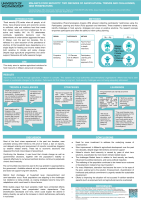| Abstract | Abstract: Introduction: As food security deteriorates worldwide, leadership decisions over the determinants of undernutrition aggravate the issue. In Malawi, over the past two decades, this is reflected in a slow reduction of the prevalence of stunting. At the household level, dependency on a single staple for feeding and income makes them both sensitive to climate and policy change. Despite large agricultural programmes and donor support, Malawians still suffer seasonal hunger. This study aims to explore agricultural solutions for food insecurity in Malawi using local knowledge.
Methods: A qualitative strategy of inquiry using Interpretative Phenomenological Analysis (IPA) allowed collecting participants’ testimonies using Participatory Learning and Action (PLA) approach and interviews. These enabled to determine trends, identify challenges in food security, strategies, and views on positive solutions. The research process empowers participants and offers the ability to inform policy planning.
Results: The answer to improving food security through agriculture in Malawi is complex. This explains why local authorities and international organizations’ efforts have had a slow impact on sustainable changes to the situation. So far, Malawi’s issues might have not been addressed adequately.
Conclusion: The agricultural solutions proposed by participants suggest the need for investment to address the underlying causes of undernutrition. This supports existing knowledge of the interrelationship between appropriated nutrition and economic development. Malawi’s situation serves as an example, that decisions about land possession, market structure, prices governance, food production and distribution can lead to semi-starvation. In result this feed into the cycle of chronic undernutrition, poverty, and inequality. |
|---|
